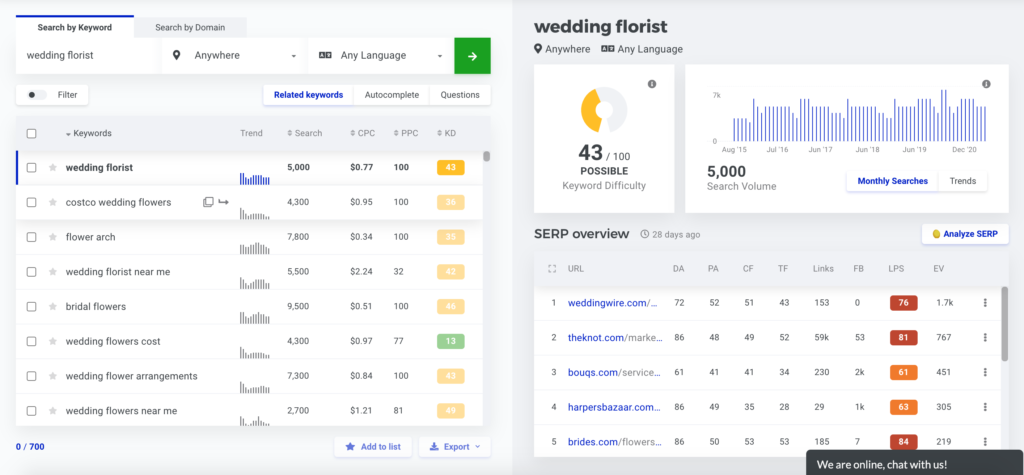You’ve probably heard that your business needs to be using keywords for search engine optimization (SEO). But what are keywords, why do they matter, and how can you use them to boost your business’ digital marketing efforts? Follow this guide to learn how to find the best keywords for your business!
- What Are Keywords?
- Why Are Keywords Important?
- How to Find Keywords for Your Business
- How to Make a Keyword List for Your Business

What Are Keywords?
Simply put, keywords are words and phrases that people use in search engines to find information, products, and services. For example, if you’re shopping online for a new pair of running shoes, you might type “best running shoes” into Google. This tells Google exactly what you’re looking for. Google then combs through its index of websites to find pages that mention “running shoes” and “best running shoes” and then displays those websites in its search engine results pages (SERPs).
Why Are Keywords Important?
Keywords are important to include in your website content, local business listings, paid ads, and other online business descriptions because they tell Google who you are and what you offer, which makes it more likely that you’ll be displayed in search engine results for relevant search queries. Think about it this way—if keywords are how people find information, products, and services online, then that means keywords are an opportunity for your business to reach new customers through search engines.
How to Find Keywords for Your Business
In order to discover the best and most relevant keywords for your business, you’ll need to conduct keyword research. This allows you to see what words and phrases searchers are using in relation to your business.
Keyword Research Tools
There are plenty of free and advanced online SEO tools you can use to get started with keyword research.
Free Keyword Tools
Free keyword research tools are a great option if you want surface-level data about common search terms. However, they don’t provide insights into monthly search volume, keyword difficulty, and more, which means they’re not ideal if you’re doing more intensive SEO work for your business.
Advanced Keyword Tools
Advanced keyword research tools provide in-depth insights into keywords, including monthly search volume, keyword difficulty, search trends by region, which websites are already ranking for those keywords, and more. These are recommended if you’re developing an SEO strategy for your business.
Choosing Good Keywords
Before you start building a list of keywords for your business, it’s important to understand what makes a good keyword. There are three factors to consider when looking at keywords: relevance, volume, and difficulty.
Relevance
Don’t choose keywords that don’t align with your business and what you offer. If, for example, you’re a chiropractor, you wouldn’t use keywords for dentistry. The point is to use keywords that are relevant to what you want to be found for. So, using the same example, “chiropractor in Chicago” would be a good keyword if you’re trying to get more chiropractic customers in the Chicago area.
Volume
Keywords are measured by monthly search volume, which is the amount of times a keyword is searched per month. The more monthly searches there are, the more valuable that keyword is. But more monthly searches also mean the keyword is going to be more competitive, so it might be harder to get good placement in search engine results when using that keyword. This is why it’s good to find a wide range of keyword options from highly competitive to not-so competitive.
Difficulty
Keyword difficulty is primarily based on domain authority—that is, the quality, age, backlink profile, and other authoritative factors of a website. So if a website with a stronger domain is using a particular keyword, that means it’s more difficult and harder to show up for. Similar to the aforementioned monthly search volume, it’s smart to have a good mix of difficult and easy keywords to use for your business.
How to Make a Keyword List for Your Business
With your keyword tool, you can begin compiling a list of top keywords for your business that you can implement into your webpages, paid ads, social media profiles, local listings, and more. Here are some tips for getting your keyword list together and targeting the best options.

Define General Keywords
Start by making a list of general words and phrases that are related to your business and industry (These will most likely be competitive terms). For example, let’s say you’re a florist that specializes in wedding flowers.
General Keywords Example
- wedding florist
- wedding flower arrangements
- bridal flowers
- wedding flower decoration
Outline More Specific Keywords
After you get your list of general keywords together, move onto words and phrases that are more specific to the things you offer (These may be less competitive terms). Again, using our wedding florist example…
Specific Keywords Example
- boho wedding flowers
- orchid wedding centerpieces
- pastel wedding flowers
- pink rose bridal bouquet
Include Competitor Keywords
If you have one of the more advanced keyword research tools, you can check out which keywords your competitors rank for by plugging their website URL in. You’ll see the list of keywords they appear for in search engine results, and you may even be able to see what SERPs position they have for that keyword. It’s a good idea to include these keywords in your list, too, so that you can keep up with your competitors.
Check Questions Around Keywords
Many keyword tools often allow you to see search engine questions that are asked around a keyword. These can be helpful not only in terms of building out your keyword list, but also for understanding what kinds of content customers are looking for. So if the search term is “wedding florist,” you might see questions like:
- How much does a wedding florist cost?
- What does a wedding florist do?
- How do I pick a wedding florist?
Interested in learning more about keyword research and how it can be used to achieve SEO content marketing goals? Check out A More Targeted Approach to Keyword Research in Content Marketing.
Need help with keyword research and implementing keywords in your website content? Hurrdat Marketing has the digital marketing services you need. Learn more about SEO services and content marketing services!



